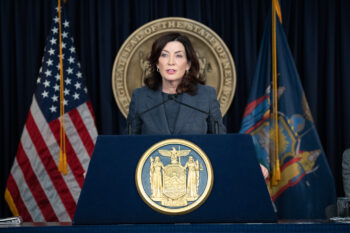
Governor Kathy Hochul. Image Credit: Office of Governor Kathy Hochul.
On August 19, 2024, Governor Kathy Hochul announced the $16.5 million contribution to decarbonize and improve existing affordable housing in New York City through the Resilient and Equitable Decarbonization Initiative for Existing Buildings (REDi: EB) Program. This program is administered New York City Department of Housing Preservation and Development in partnership with the New York State Energy Research and Development Authority (NYSERDA). This program is funded through the State’s Clean Energy Fund (CEF).
The goal of the program is to modernize New York City Department of Housing Preservation and Development regulated buildings by creating efficient living spaces that will reduce the use of fossil fuels, lower greenhouse gas emissions, and improve indoor air quality for low-to moderate-income residents. The program will achieve these goals by improving access to funding for electrification and energy efficiency retrofit upgrades for affordable housing building owners and developers.
Building owners and developers who are part of the Resilient and Equitable Decarbonization Initiative for Existing Buildings Program may apply to receive funding
until December 31, 2025, or until funds have been exhausted. Of the $16.5 million, $15 million is now available through Resilient and Equitable Decarbonization Initiative for Existing Buildings Program and may be used to cover projects that involved electrify space heating, domestic hot water production, and improvements to the building’s insulation, windows, and ventilation systems. The New York City Department of Housing Preservation and Development, New York State Energy Research and Development Authority, and technical consultants will determine what projects fit the eligibility for this funding. The maximum award is $1 million per building or up to $2 million for multi-building projects. Incentive funds will be paid to the project by New York City Department of Housing Preservation and Development during the construction phase.
Of the $16.5 million, $1.5 million is now available through Resilient and Equitable Decarbonization Initiative for Existing Buildings Program to fund technical assistance throughout the design, construction, and post-construction phases for projects.
In New York, buildings are the main source of greenhouse gas emissions, through New York State Research and Development Authority and utility programs, over $6.8 billion has been invested to decarbonize buildings. Programs like this hope to reduce statewide carbon emissions by improving energy efficiency in buildings and advancing statewide installations of onsite storage, renewables, and electric vehicle charging equipment. This program will also advance New York State’s goal of reducing on-site energy consumption by 185 TBtu by 2025, the equivalent of powering 1.8 million homes.
Governor Kathy Hochul said, “In partnership with New York City, we’re advancing funding to reduce building emissions and tackle the climate crisis. We are ensuring developers and building owners have access to the resources they need to retrofit affordable housing so we can decarbonize buildings in underserved communities.”
New York State Energy Research and Development Authority President and CEO Doreen M. Harris said, “NYSERDA and HPD’s collaborative initiative will advance the replicable use of clean and efficient technologies that reduce energy use and the carbon footprint of multifamily buildings. This funding not only helps to expand access to clean, comfortable and healthy living environments for those in New York City but will help strengthen the resiliency of these buildings to withstand the impacts of climate change for years to come.”
New York City Department of Housing Preservation and Development Commissioner Adolfo Carrión Jr. said, “REDi marks a pivotal moment in our mission to confront climate change while ensuring fair access to sustainable and affordable housing. Climate change will touch every corner of our city but the impacts will be most deeply felt by the most vulnerable New Yorkers. It is our moral imperative to create more sustainable practices while we stay laser focused on creating and preserving affordable housing. Today, we’re not only changing how we finance sustainable housing construction, but also redefining the pivotal role housing plays in our collective battle against climate change.”
By: Chelsea Ramjeawan (Chelsea is the CityLaw intern and a New York Law School student, Class of 2025.)

